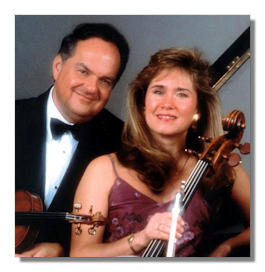
The Internet's Premier Classical Music Source
Related Links
- Latest Reviews
- More Reviews
-
By Composer
-
Collections
DVD & Blu-ray
Books
Concert Reviews
Articles/Interviews
Software
Audio
Search Amazon
Recommended Links
Site News
 Concert Review
Concert Review
Bruckner in Detroit

- Wolfgang Mozart: Die Zauberflöte, K. 620 (Overture)
- André Previn: Double Concerto for Violin & Cello
- Anton Bruckner: Symphony #4 in E Flat Major "Romantic"
Jaime Laredo, violin
Sharon Robinson, cello
Detroit Symphony Orchestra/Leonard Slatkin
Detroit, Orchestra Hall, 25 April 2015
I remember a former Detroit Symphony employee commenting dryly that Bruckner in Detroit never sold well. And despite the full house at the start of the concert, much of the audience did depart before the Bruckner began the second half. Bruckner may be having a revival on disc, but he's never been a big sell for the working class town of Detroit (someone obviously forgot to tell Cleveland that this was a class thing). He's never been a sell for the conductor, either; Slatkin has been quoted in interviews – and if I recall, one right here in Detroit upon becoming Music Director – that he doesn't "do" Bruckner.
Slatkin also doesn't conduct much opera, but Mozart's The Magic Flute has been an exception. And the veteran maestro conducted the Overture well, with plenty of energy and crisp phrasing. The Detroit Symphony has an exceptional group of string and wind players that I have written extensively about, and they added much to this fine curtain-raiser. Far less impressive was the Double Concerto (2014) which held lots of musical ideas but reasonably few good tunes. I've no doubt that Laredo and Robinson have known the conductor for years (see also: Lynn Harrell) and much like Harrell they are both past their prime as soloists. This is at least the second time this year that the Detroit Symphony has brought in soloists for the "Concerto in America" series and the results have backfired. Slatkin actually conducted very well, and the husband-wife team – for whom the piece was written – did have moments of charm and unquestionable command. It's not even that Previn can't write concertos, because his Violin Concerto "Anne-Sophie" is a gorgeous creation that his ex-wife should be very proud of. But this particular double concerto feels awfully disjointed and longer than it actually is.
Slatkin's Bruckner reminded me a lot of his Mahler, and this proved both good and bad. All the "big" moments came off very well, with some surprisingly excellent brass playing and some really lovely string sonorities. Slatkin favored brisk tempos that kept the music from dragging, and somehow managed not to let the brass dominate the sonic picture. Unfortunately, you didn't get the impression that the conductor likes Bruckner. The composer isn't exactly fun and games, but you do have to enjoy yourself, and between the climaxes there were a few dull spots. Also, the quick tempos robbed the music of some of its inevitability and power, though I suspect the approach was intended to avoid ensemble fatigue. It nearly worked, as I heard only a few problems from the much-maligned brass players. Aside from quickness, there were very few other notable features, and the overall impression was a good but hardly profound Bruckner experience. As the season draws to a close, it strikes me that this describes my feelings about the entire year; good, but not great.
Copyright © 2015, Brian Wigman












